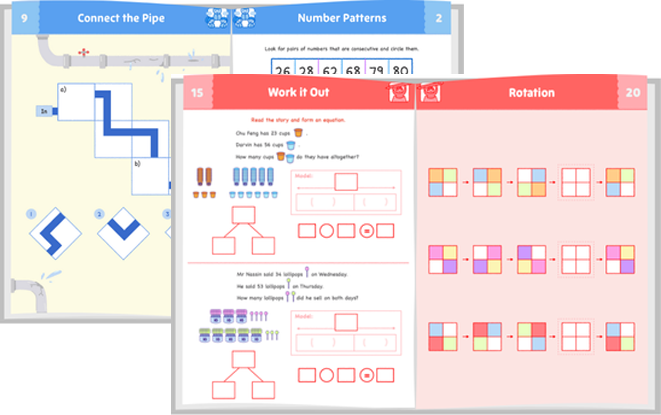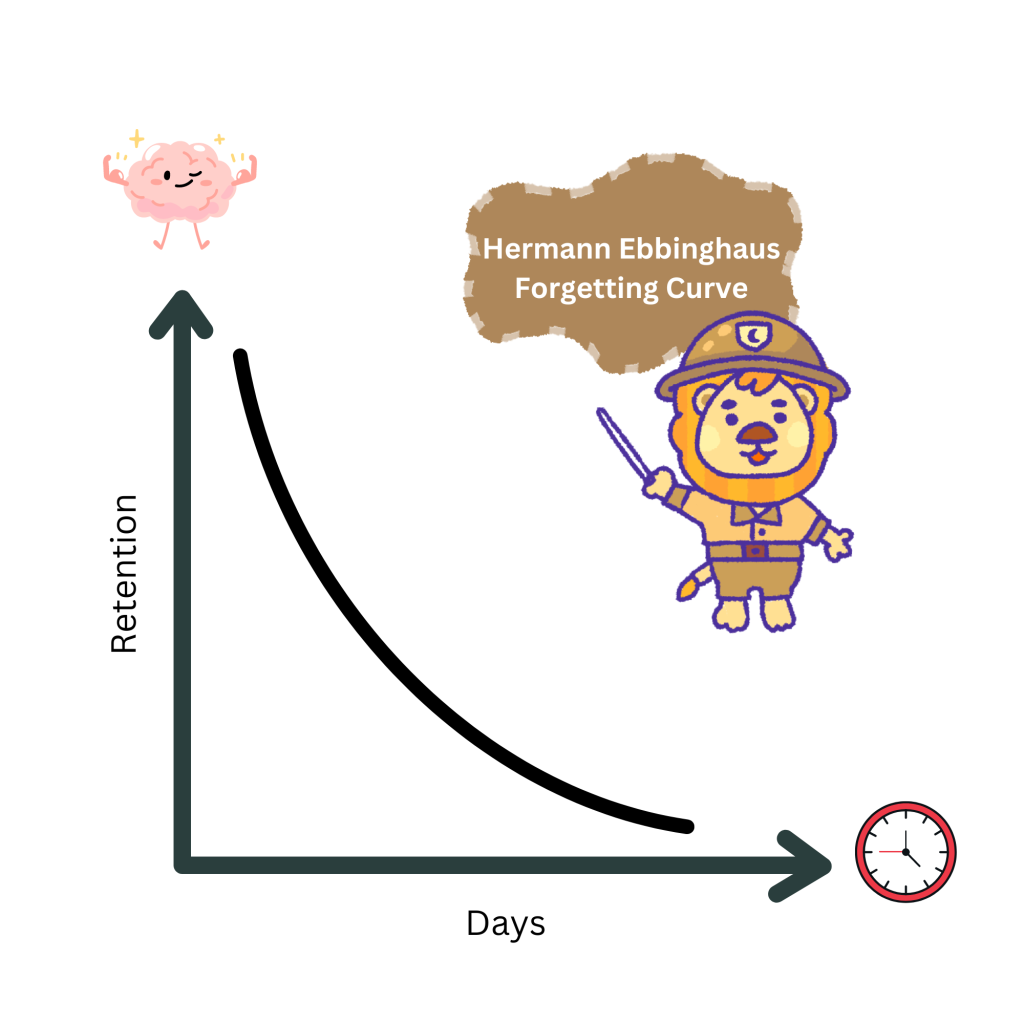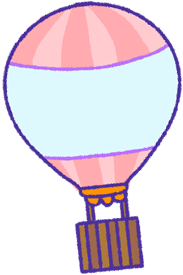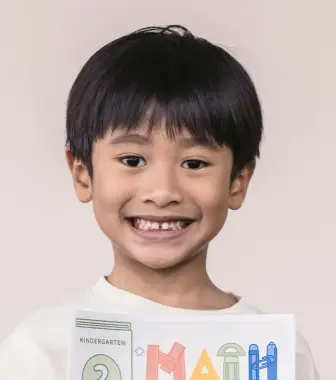OUR PROGRAMS



Our Curriculum
Our Curriculum
- Colourful, vibrant & engaging
- Group and independent learning
- Gamified / activities based materials
- Progressive Conceptual Approach (Spiral)
- Leverages S P A C E D Repetition
- Unique ‘Elevated-Learning’ approach
- Develops latent knowledge / understanding
- Regular assessments & progress reports
Progressive Conceptual Approach

At MathBond, the Progressive Conceptual Approach involves gradually building up the students’ understanding of a mathematics concept by transitioning from basic to more complex ideas in a structured (spiraled) approach. The Progressive Conceptual Approach is particularly effective for subjects like mathematics, where mastering foundational concepts is crucial for tackling more advanced topics later on.
For example, as shown above, instead of cramming 20 questions of the same concept into one week, the Progressive Conceptual Approach further divides the the concepts in to bite-sized Learning Objectives and distributes the concepts over 4 to 6 weeks to ensure better retention and greater opportunities for teacher-coach intervention.
Elevated Learning
Mathbond’s Elevated Learning approach focuses on introducing skill-based mathematical questions that serve as a conceptual foundation, helping students build the necessary skills for tackling more advanced topics later on.
This progressive approach ensures that students develop a deep understanding of fundamental mathematical concepts, sparks their interest in solving problems and aids in DSA preparation, all the while preparing them for future learning challenges.
Forgetting Curve - S P A C E D Repetition
Forgetting CurveS P A C E D Repetition

The Forgetting Curve is a concept first introduced by Hermann Ebbinghaus that describes how information is lost over time when there is no attempt to retain it.
According to the Forgetting Curve, information is rapidly forgotten shortly after learning, when it is not reviewed or reinforced.
By incorporating S p a c e d Repetition, Singapore’s MathBond effectively addresses the Forgetting Curve and reinforces students’ understanding of mathematical concepts. This approach ensures that learners revisit and reinforce their knowledge at strategically timed intervals, helping to close gaps and improve long-term retention.

HappyStories

MathBond is more challenging than the assessment books I do and it is much more fun too! I like how it is full of colours and activities that I can play.
Shannon, Clementi Primary


I love learning at MathBond because I become better at my addition and subtraction. The school books are boring and the MathBond makes it fun to do.
Issei Fong, SuperLand



Program Levels

KinderGarten 1 & 2

Primary 1 & 2

Primary 3 & 4

Primary 5 & 6

Secondary 1 to 4

Junior College 1 & 2
Why Join us?
Mathbond offers a comprehensive curriculum for ages 5 to 18, designed to support every stage of your child’s learning journey. From foundational skills to advanced topics, our engaging materials ensure they receive the right support and challenge throughout their academic development.
Our coaches are committed to inspire, mentor and provide a safe and effective environment to to foster positive learning experiences each day.
Why Join us?
Mathbond offers a comprehensive curriculum for ages 5 to 18, designed to support every stage of your child’s learning journey. From foundational skills to advanced topics, our engaging materials ensure they receive the right support and challenge throughout their academic development.
Our coaches are committed to inspire, mentor and provide a safe and effective environment to to foster positive learning experiences each day.


Kindergarten 1 & 2
In Kindergarten 1 & 2, children lay the groundwork for their mathematical journey. They learn basic counting, number recognition, simple addition and subtraction, and shapes. These foundational skills are crucial for understanding more complex operations in Primary 1 & 2. They also begin to develop an understanding of patterns and basic measurement, setting the stage for more advanced concepts later on.
Our coaches are committed to inspire, mentor and provide a safe and effective environment to to foster positive learning experiences each day.

Primary 1 & 2
Building on the basics from Kindergarten, Primary 1 & 2 students extend their addition and subtraction skills to include simple multiplication and division. They explore basic geometry, such as 2D shapes and simple measurement, and start solving basic word problems. These skills are essential for understanding fractions, decimals, and multi-step problem-solving in Primary 3 & 4, providing a solid foundation for more advanced mathematical reasoning.
Our coaches are committed to inspire, mentor and provide a safe and effective environment to to foster positive learning experiences each day.

Primary 3 & 4
Primary 5 & 6 students advance their knowledge by mastering operations with fractions and decimals, learning about ratios and percentages, and beginning simple algebraic thinking, such as solving basic equations. This stage also includes intensive problem-solving to prepare for the National Exams. The advanced concepts introduced here build upon the foundational skills from Primary 3 & 4 and set the stage for the more complex algebra and geometry topics in Secondary 1 to 4.

Primary 5 & 6
It is a collection of originals that have merged together, under one roof. Bound in purpose. Cemented by a promise. To one another, and to each of our students. To create moments that matter. And, to never, ever stop learning.
Our coaches are committed to inspire, mentor and provide a safe and effective environment to to foster positive learning experiences each day.

Secondary 1 to 4
In Secondary 1 to 4, students build on their Primary 5 & 6 knowledge by studying advanced algebra, including polynomials and quadratic equations, and exploring complex geometry, such as coordinate geometry and the properties of shapes. They also cover statistics and trigonometry, enhancing their problem-solving skills. This stage prepares them for the O-level exams and integrates their previous learning into a comprehensive understanding of high school mathematics.
Our coaches are committed to inspire, mentor and provide a safe and effective environment to to foster positive learning experiences each day.

Junior College 1 & 2
Junior College 1 & 2 students advance their mathematical skills with a focus on calculus (differentiation and integration), advanced algebra (functions, complex numbers), and higher-level statistics. They also tackle in-depth problem-solving and apply these concepts to various real-world scenarios. This stage builds on the advanced topics covered in Secondary 1 to 4, ensuring a deep and thorough understanding of mathematics in preparation for A-level exams and future academic endeavors.



